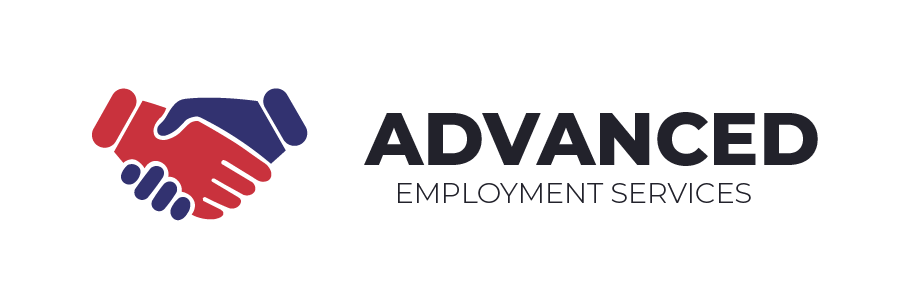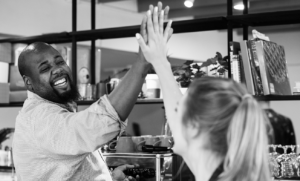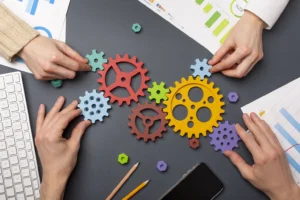Table of Contents
A job interview can be a nerve-wracking experience, but with the right preparation, you can navigate it with confidence and poise. Whether it’s your first interview or you’re a seasoned professional, understanding what to expect and how to prepare is crucial for success. In this comprehensive guide, we’ll walk you through the key aspects of getting through a job interview, including what to expect, the types of questions you might encounter, what questions you should ask, what to wear, and more. With the support of Advanced Employment Services, you’ll be well-equipped to make a good impression and land the job you want.
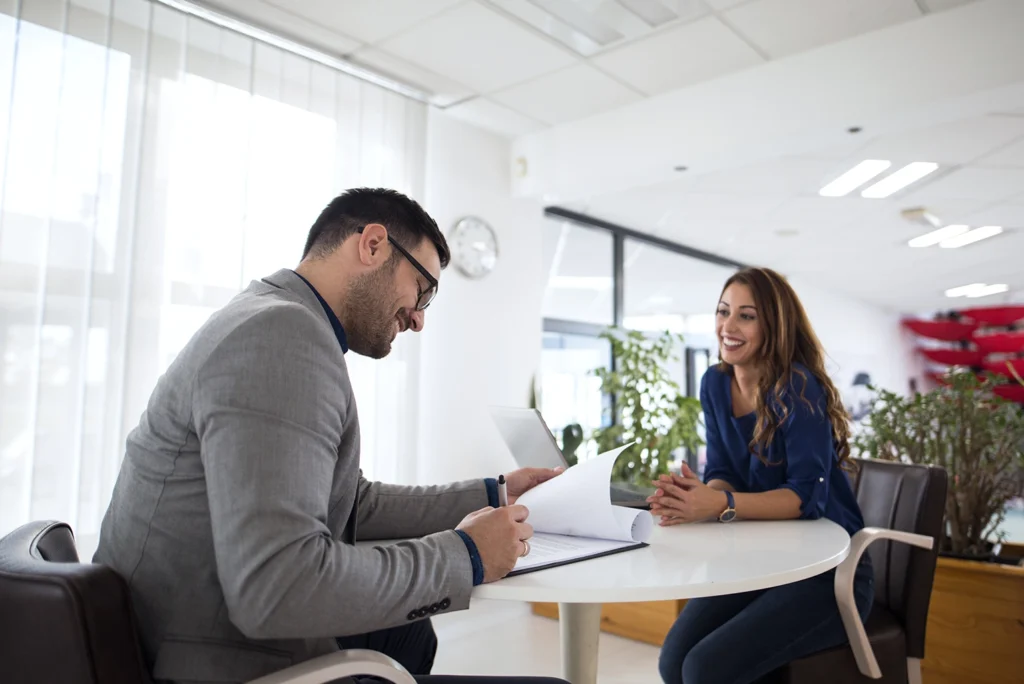
What to Expect at a Job Interview
Job interviews can vary significantly depending on the company, role, and industry, but there are common elements you can expect in most interviews:
Introduction and Small Talk
The interview will typically start with introductions and some small talk. This is your opportunity to make a positive first impression by being friendly, polite, and engaging. Smile, offer a firm handshake if in person, and show enthusiasm.
Overview of the Company and Role
The interviewer may provide an overview of the company and the specific role you are applying for. Listen carefully, as this information will help you tailor your responses to demonstrate how your skills and experience align with the company’s needs.
Discussion of Your Experience and Qualifications
You’ll be asked to discuss your previous experience, qualifications, and how they relate to the job. Be prepared to highlight your accomplishments and how they make you a good fit for the position.
Behavioral and Situational Questions
Many interviewers use behavioral and situational questions to assess how you handle various work situations. These questions often start with phrases like “Tell me about a time when…” or “How would you handle…”.
Opportunity to Ask Questions
Toward the end of the interview, you’ll usually be given the chance to ask questions. This is an important part of the interview process, as it shows your interest in the role and the company.
Closing and Next Steps
The interview will conclude with a discussion of the next steps in the hiring process. Be sure to express your enthusiasm for the role and thank the interviewer for their time.
Types of Questions You Might Encounter
Understanding the types of questions you might encounter in a job interview will help you prepare effective answers. Here are some common types of interview questions:
Traditional Questions
Traditional interview questions are straightforward and focus on your background, skills, and experiences.
Examples:
- “Tell me about yourself.”
- “Why do you want to work for this company?”
- “What are your strengths and weaknesses?”
Behavioral Questions
Behavioral questions are designed to assess how you’ve handled situations in the past, as this is often an indicator of how you’ll perform in the future.
Examples:
- “Tell me about a time when you faced a challenge at work and how you dealt with it.”
- “Describe a situation where you had to work as part of a team.” How to Answer:
Use the STAR method (Situation, Task, Action, Result) to structure your answers. Describe the Situation you were in, the Task you needed to accomplish, the Actions you took, and the Result of those actions.
Situational Questions
Situational questions present hypothetical scenarios to assess how you might handle future challenges.
Examples:
- “How would you handle a disagreement with a coworker?”
- “What would you do if you were asked to complete a task you weren’t familiar with?” How to Answer:
Explain your thought process and how you would approach the situation. Highlight your problem-solving skills and ability to stay calm under pressure.
Technical or Skill-Based Questions
These questions assess your specific skills and technical knowledge relevant to the job.
Examples:
- “Can you walk me through your process for [specific task]?”
- “What software tools are you proficient in?” How to Answer:
Provide clear, concise answers that demonstrate your expertise. Be prepared to discuss specific examples of how you’ve applied your skills in previous roles.
Cultural Fit Questions
Employers want to ensure you’ll be a good fit for the company’s culture. These questions assess your values, work style, and how you interact with others.
Examples:
- “What type of work environment do you thrive in?”
- “How do you handle feedback?” How to Answer:
Be honest about your preferences and provide examples that show how you’ve successfully adapted to different work environments.

Questions to Ask Your Interviewer
Asking thoughtful questions during your job interview is essential for making a good impression. It shows that you’re genuinely interested in the role and helps you gather important information about the job and company.
Here are some questions you might consider asking:
About the Role
- “Can you describe a typical day in this role?”
- “What are the key challenges someone in this position might face?”
About the Team and Work Environment
- “Can you tell me more about the team I’d be working with?”
- “How would you describe the company culture?”
About Growth and Development
- “What opportunities for professional development are available?”
- “How do you measure success in this role?”
About the Company
- “What are the company’s goals for the next year?”
- “How does this role contribute to the company’s mission?”
About Next Steps
- “What are the next steps in the hiring process?”
- “When can I expect to hear back from you?”
What to Wear to a Job Interview
What you wear to a job interview is a key part of making a good impression. Your attire should be appropriate for the company culture and the role you’re applying for.
Research the Company Dress Code
Before the interview, research the company’s dress code. If you’re unsure, it’s better to be slightly overdressed than underdressed.
- Corporate Environment: Opt for a formal business suit in neutral colors. Men should wear a tie, and women might consider a blazer with slacks or a skirt.
- Business Casual Environment: Business casual attire might include dress slacks or a skirt with a button-down shirt or blouse. A blazer is optional but can add a polished look.
- Creative or Startup Environment: These environments often have a more relaxed dress code. You might wear something smart casual, such as chinos and a nice shirt or a simple dress with flats.
Pay Attention to Grooming and Accessories
- Ensure your clothes are clean, pressed, and fit well.
- Keep accessories minimal and professional.
- Choose closed-toe shoes that are clean and polished.
- Maintain neat grooming—clean hair, trimmed nails, and light makeup, if any.
Comfort Matters
While you want to look professional, it’s also important to be comfortable. If you’re constantly adjusting your outfit or feel restricted, it can distract you from the interview.
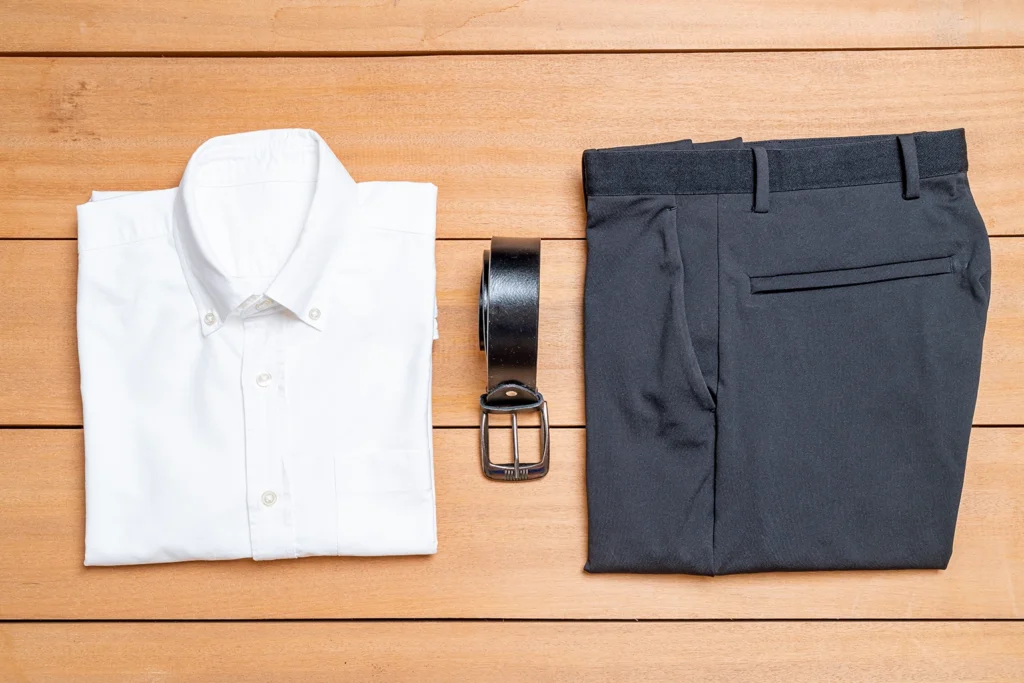
Tips for Making a Good Impression
In addition to your appearance, several other factors contribute to making a good impression during a job interview. Here are some tips to ensure you present yourself in the best possible light:
Be Punctual
Arrive 10-15 minutes early for your interview. This shows that you’re respectful of the interviewer’s time and demonstrates your punctuality. If it’s a virtual interview, log in a few minutes early to ensure your technology is working properly.
Body Language
Your body language can speak volumes. Maintain good posture, make eye contact, and avoid fidgeting. A firm handshake (in in-person interviews) and a warm smile can set a positive tone.
Be Positive and Enthusiastic
Show enthusiasm for the role and the company. Positivity is contagious, and expressing genuine interest can make a strong impression on the interviewer.
Listen Actively
Pay close attention to what the interviewer is saying and respond thoughtfully. Active listening not only helps you provide better answers but also shows that you’re engaged in the conversation.
Follow Up
After the interview, send a thank-you email to the interviewer(s). Express your appreciation for the opportunity to interview and reiterate your interest in the position. This simple gesture can leave a lasting positive impression.
Preparing for Success with Advanced Employment Services
Getting through a job interview successfully requires preparation, confidence, and the ability to make a good impression. At Advanced Employment Services, we understand the challenges that come with job searching and the importance of excelling in interviews. Our team is here to support you every step of the way, from resume preparation to interview coaching and beyond.
By knowing what to expect, preparing for common interview questions, asking insightful questions, dressing appropriately, and following up afterward, you can increase your chances of landing the job you want. With the right mindset and the guidance of Advanced Employment Services, you’ll be well on your way to making a great impression and securing the job that’s right for you.
If you’re ready to take your career to the next level, contact Advanced Employment Services today. Let us help you navigate the interview process with confidence and achieve your professional goals.
